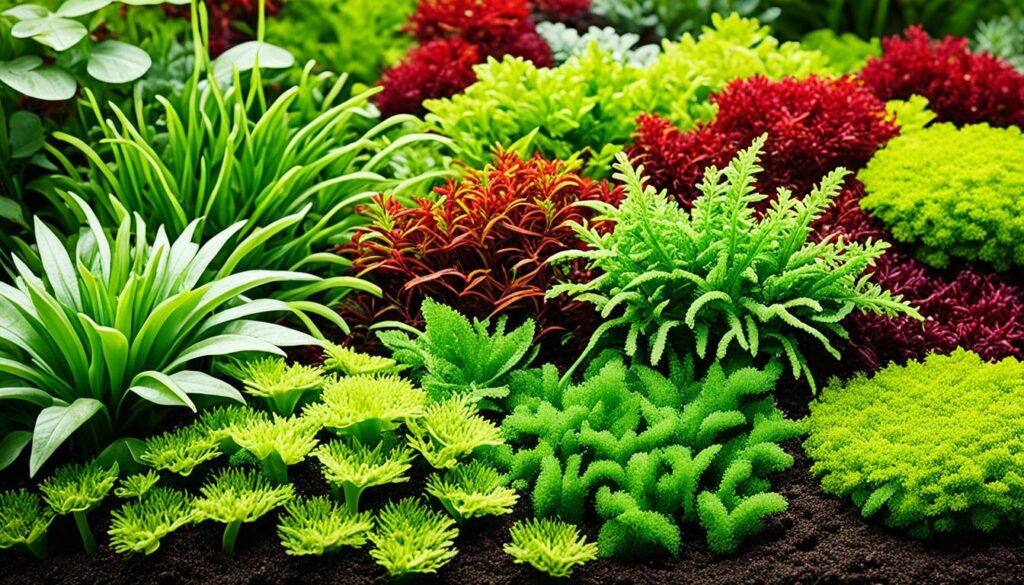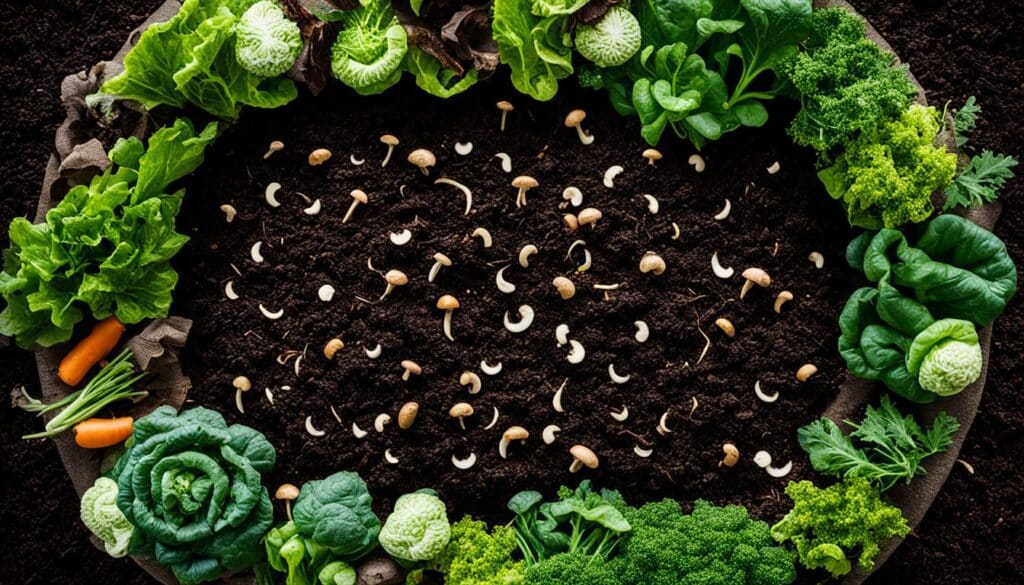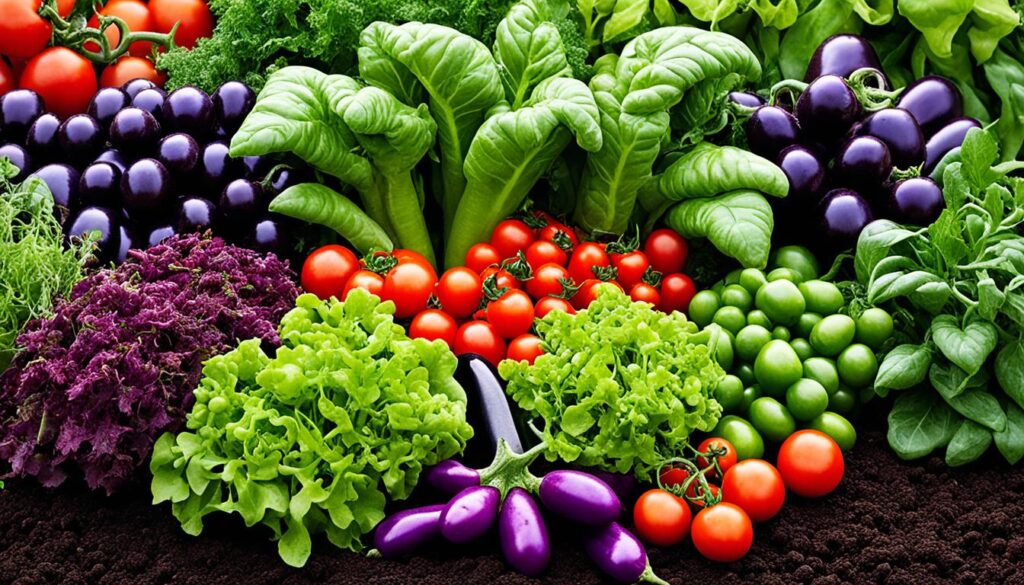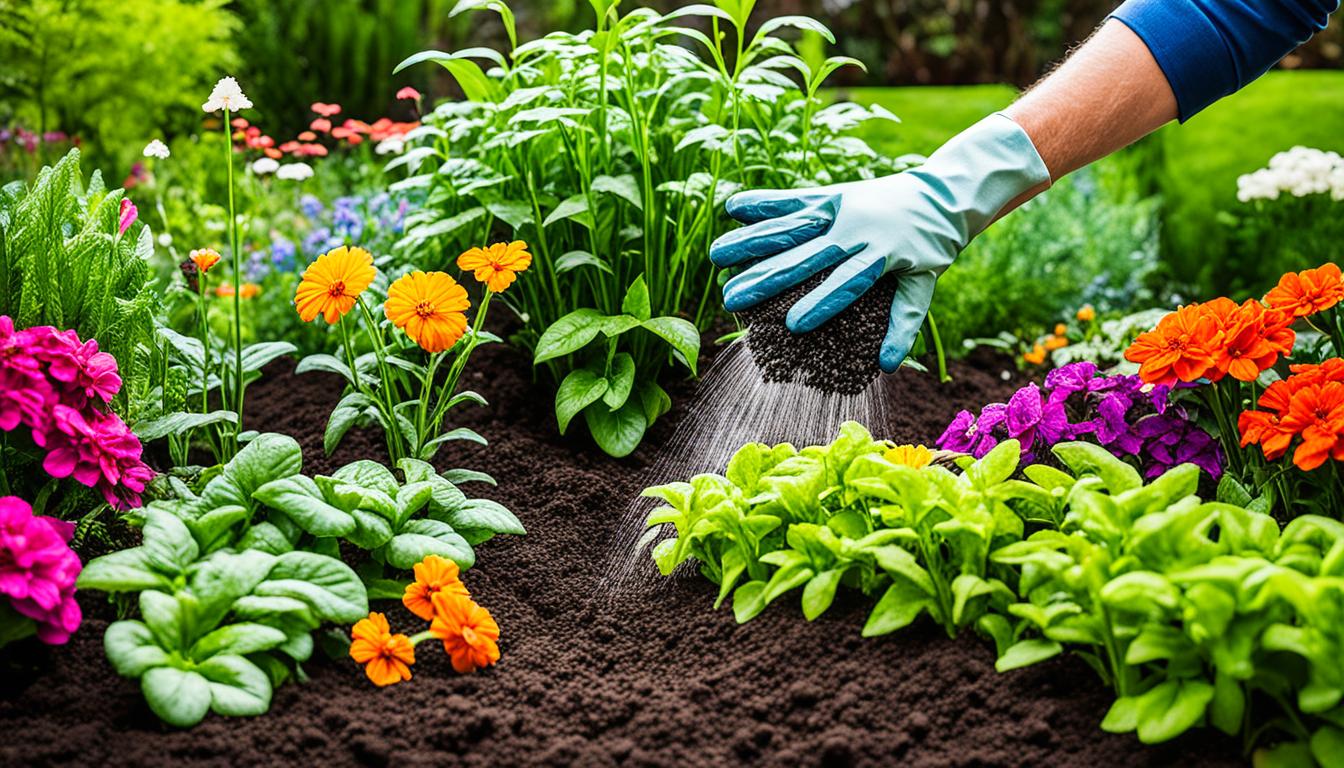Organic Fertilizer For Gardens: Boost Growth Naturally
Welcome to our guide on organic fertilizer for gardens! If you’re an eco-conscious gardener looking to promote robust plant growth and soil health, organic fertilizers are the natural solution you’ve been searching for. Unlike synthetic fertilizers, which can harm the environment and your plants in the long run, organic fertilizers utilize natural ingredients to provide essential nutrients and encourage sustainable gardening practices.
In this article, we will explore the benefits of using organic fertilizers, discuss various types of organic fertilizers available in the market, guide you on choosing the right organic fertilizer for your specific gardening needs, and provide practical tips on application techniques. We will also emphasize the importance of soil health and sustainable gardening practices in conjunction with organic fertilizers.
Key Takeaways:
- Organic fertilizers are a natural and eco-friendly alternative to synthetic fertilizers.
- They provide essential nutrients for plant growth while improving soil health.
- Choosing the right organic fertilizer depends on factors such as plant growth stage and soil conditions.
- Sustainable gardening practices complement the use of organic fertilizers.
- Maximize plant health and yield by adopting organic fertilizer brands and incorporating homemade organic fertilizers.
Understanding Organic Fertilizers
In organic gardening, using the right fertilizer is crucial for promoting plant growth and maintaining soil health. Unlike synthetic fertilizers that contain chemicals, organic fertilizers are derived from natural sources, making them safe and eco-friendly alternatives. Let’s explore the various types of organic fertilizers and their benefits in enhancing your garden’s productivity.
The Benefits of Organic Fertilizers
Organic fertilizers, such as compost, manure, and kelp, provide essential nutrients to plants while improving overall soil fertility. These natural fertilizers enrich the soil with organic matter, enhancing its structure and water-holding capacity. Additionally, they promote the growth of beneficial soil microbes that aid nutrient uptake by plants.
| Type of Organic Fertilizer | Main Nutrients | Benefits |
|---|---|---|
| Compost | Nutrient-rich organic matter | Improves soil structure, moisture retention, and nutrient availability |
| Manure | Nitrogen, phosphorus, potassium | Supplies essential nutrients, enhances soil fertility |
| Kelp | Trace minerals, growth hormones | Stimulates root development, enhances plant growth and yield |
Choosing the Right Organic Fertilizer for Your Garden
When selecting organic fertilizers, consider the specific nutrient needs of your plants. Different fertilizers vary in their nutrient composition, so it’s essential to choose the right blend for optimal results. For example, nitrogen-rich fertilizers like blood meal or feather meal are ideal for leafy greens, while fruiting vegetables benefit from phosphorus-rich options like bonemeal. Organic fertilizers are available in granular, liquid, and pellet forms, offering flexibility in application methods.
It’s important to note that organic fertilizers release nutrients slowly, providing a steady supply of nourishment to plants over an extended period. This slow-release nature allows for better nutrient absorption, reducing the risk of nutrient runoff and leaching, which can harm the environment.
By incorporating organic fertilizers into your gardening practices, you can enrich your soil, promote healthy plant growth, and contribute to a sustainable and eco-friendly approach to gardening.
Choosing the Right Organic Fertilizer
When it comes to organic gardening, choosing the right organic fertilizer is crucial for promoting optimal plant growth and ensuring a healthy vegetable garden. With a wide range of options available, such as blends, bone meal, amendments, and seaweed-based fertilizers, it’s essential to consider various factors before making a decision.
One important consideration is the specific needs of your plants. Different plants have different nutrient requirements at various stages of growth. For example, young seedlings may benefit from an all-purpose organic fertilizer that provides a balanced blend of essential nutrients. On the other hand, fruiting vegetables may require a fertilizer rich in phosphorus to promote flower and fruit development.
Soil conditions also play a significant role in determining the right organic fertilizer. Conducting a soil test can help you assess the nutrient levels and pH balance of your soil. If your soil lacks organic matter, a blend or amendment containing organic matter, such as compost or well-rotted manure, can help improve soil fertility and structure.
Moreover, consider the convenience and application method that best suits your gardening style. Some gardeners prefer granular fertilizers that slowly release nutrients over time, while others opt for liquid fertilizers for easy and quick absorption. Seaweed-based fertilizers are an excellent choice for those looking to add beneficial minerals to their plants.
To help you make an informed decision, here is a table comparing different types of organic fertilizers:
| Type of Organic Fertilizer | Main Ingredients | Benefits |
|---|---|---|
| Blends | A mix of organic matter, minerals, and nutrients | Provides a balanced blend of essential nutrients for overall plant growth |
| Bone Meal | Ground animal bones | Rich in phosphorus and calcium, promotes root development and strong stems |
| Amendments | Organic matter such as compost or well-rotted manure | Improves soil fertility, structure, and moisture retention |
| Seaweed-Based | Seaweed extracts | Provides trace minerals and growth-stimulating hormones, enhances plant resilience |
Remember, the key to successfully choosing the right organic fertilizer lies in understanding your plant’s nutrient requirements, evaluating your soil condition, and considering the ease of application. By selecting the appropriate organic fertilizer, you can support plant growth, enrich soil health, and grow organic vegetables with confidence.

Understanding Nutrient Requirements
Essential nutrients play a crucial role in supporting plant growth and overall health. When it comes to organic gardening, understanding the nutrient requirements of your plants is essential for successful cultivation. In this section, we will explore the importance of nitrogen, phosphorus, and potassium (NPK) as well as organic sources for these nutrients.
The Importance of NPK
Nitrogen, phosphorus, and potassium are known as macronutrients because plants require them in larger quantities compared to other essential nutrients. Each of these nutrients serves a specific role:
- Nitrogen (N): Nitrogen is responsible for promoting leaf and stem growth. It helps in the production of chlorophyll, which is essential for photosynthesis. Nitrogen deficiency can result in stunted growth and yellowing of leaves.
- Phosphorus (P): Phosphorus is crucial for root development, flowering, and fruiting. It aids in energy transfer and promotes the growth of strong and healthy roots. Phosphorus deficiency can lead to poor root development and reduced flowering and fruiting.
- Potassium (K): Potassium helps plants in various physiological processes, including water uptake, nutrient transport, and disease resistance. It enhances overall plant growth and increases tolerance to environmental stressors. Potassium deficiency can result in weakened plant structure and increased susceptibility to diseases.
Meeting the nutrient requirements of your plants is essential to ensure healthy growth and abundant harvests. Organic fertilizers provide an excellent source of NPK while enriching the soil with other essential minerals.
Organic Sources of NPK
Organic fertilizers offer a sustainable and eco-friendly alternative to synthetic options. They provide slow-release nutrients and promote long-term soil health. Understanding the organic sources of NPK can help you choose the right fertilizers for your garden:
- Blood meal: Blood meal is a potent source of nitrogen. It is derived from the blood of animals, such as cattle or pigs. It is a quick-release nitrogen fertilizer that stimulates lush green foliage growth. Blood meal is particularly beneficial for nitrogen-demanding plants like leafy greens and crops grown for their foliage.
- Feather meal: Feather meal is another nitrogen-rich organic fertilizer. It is made from sterilized poultry feathers and provides slow-release nitrogen to plants. Feather meal is ideal for promoting long-term growth and is often used in organic lawn care programs.
- Fish bone meal: Fish bone meal is a great source of phosphorus and calcium. It is created by grinding fish bones from seafood processing facilities. This organic fertilizer is slow-release, allowing for gradual nutrient release over time. Fish bone meal is beneficial for root growth and flowering plants.
- Casting: Worm castings, also known as vermicompost, are rich in all three macronutrients, making them an excellent organic fertilizer for overall plant growth. Worm castings also contain beneficial microorganisms that enhance soil fertility and improve nutrient uptake by plants.
- Potassium-rich organic fertilizers: Organic materials like wood ash and kelp meal are rich sources of potassium. Wood ash, derived from burnt wood, provides a readily available form of potassium. Kelp meal, made from seaweed, contains various essential nutrients and growth-promoting compounds.
By incorporating these organic nutrient sources into your garden, you can provide your plants with the necessary NPK for optimal growth and development.
Soil Testing and Nutrient Ratios
To accurately determine the nutrient requirements of your soil, it is crucial to perform soil testing. This process helps identify any nutrient deficiencies or imbalances, allowing you to adjust your fertilizer application accordingly. Soil testing laboratories can provide detailed analysis, including the nutrient composition and recommendations for organic fertilizer application.
Understanding nutrient ratios is essential for providing balanced nutrition to your plants. The ideal NPK ratio depends on the specific needs of your crops or plants. For example, fruiting plants may require higher phosphorus levels to promote flower and fruit production.

Determining the correct NPK ratio and using organic fertilizers tailored to your plant’s needs can help you achieve optimal growth, abundant blooms, and successful harvests in your organic garden.
Organic Fertilizer Application Techniques
Applying organic fertilizers correctly is key to ensuring optimal plant growth and maximizing the benefits of these natural products. Here are some practical techniques that will help you feed your plants effectively and promote a healthy garden.
Foliar Feeding
One technique to consider is foliar feeding, which involves spraying organic liquid fertilizers onto the leaves of your plants. This method allows nutrients to be absorbed quickly through the foliage, providing an immediate boost to plant health.
Remember to dilute the organic liquid fertilizer according to the manufacturer’s instructions before applying it as a foliar spray. This ensures that the plants receive the correct amount of nutrients without causing any harm.
In addition to providing essential nutrients, foliar feeding can also attract beneficial insects that help control pests naturally. With this technique, you not only nourish your plants but also enhance the overall health of your garden ecosystem.
Soil Incorporation
Another effective method is to work organic fertilizers into the soil. This allows the nutrients to be released gradually and becomes accessible to the plant roots. When applying organic fertilizers, make sure to distribute them evenly throughout the soil to provide an equal supply of nutrients to all plants.
If you’re using granular organic fertilizers, ensure thorough mixing with the soil to avoid concentrated pockets of nutrients that may damage root systems or cause nutrient imbalances.
Working organic fertilizers into the soil is especially beneficial before planting or during the early stages of growth. By incorporating these natural boosters, you set a solid foundation for healthy plant development and encourage vigorous root growth.
The Benefits of Seaweed Fertilizers
Seaweed fertilizers are highly beneficial for organic gardening. They not only provide essential nutrients but also contain trace elements, growth hormones, and beneficial microorganisms that contribute to overall plant health.
When using seaweed fertilizers, follow the manufacturer’s instructions for application rates. Apply them to the soil or use them as a foliar spray to nourish your plants and improve their resistance to pests and diseases.

Seaweed fertilizers are a sustainable and eco-friendly solution that can significantly enhance the growth and yield of your garden. Incorporate them into your organic gardening routine to reap their many benefits.
| Technique | Advantages |
|---|---|
| Foliar Feeding | – Instant nutrient absorption – Attracts beneficial insects |
| Soil Incorporation | – Even distribution of nutrients – Supports root growth |
| Seaweed Fertilizers | – Rich in essential nutrients – Contains trace elements and growth hormones – Improves plant resistance |
By applying organic fertilizers using these techniques, you can ensure that your plants receive the necessary nutrients for healthy growth. Experiment with different methods and find what works best for your garden. Remember, organic gardening not only benefits your plants but also contributes to the overall health of the environment.
The Importance of Soil Health
Soil health plays a crucial role in supporting optimal plant growth and ensuring long-term sustainability in gardening. By focusing on organic practices and prioritizing soil health, gardeners can create a thriving ecosystem in their gardens.
One effective way to improve soil health is through composting. By organically recycling kitchen scraps, yard waste, and other organic materials, gardeners can create nutrient-rich compost that replenishes the soil with essential nutrients. Composting not only enriches the soil but also reduces waste and supports a more sustainable gardening approach.
Another beneficial practice for soil health is the addition of coffee grounds. Coffee grounds are a readily available organic material that can be easily incorporated into the soil. They contribute valuable nutrients, such as nitrogen, potassium, and phosphorus, promoting the growth of healthy plants. Additionally, coffee grounds improve soil structure and water retention.
Compost teas are another valuable resource for enhancing soil health. Made by steeping compost in water, compost teas provide a concentrated boost of beneficial microorganisms, nutrients, and enzymes. When applied to the soil, compost teas help stimulate biological activity, improve nutrient availability, and enhance soil structure.
The quality of organic fertilizers is closely tied to soil health. When gardeners fertilize their plants organically, they not only provide essential nutrients but also contribute to the overall well-being of the soil. Organic fertilizers are derived from natural sources, such as kelp meal, and are formulated to nourish plants while preserving soil health. By choosing organic fertilizers that support soil biology, gardeners can fertilize their plants in a sustainable and environmentally friendly manner.
It is important to prioritize soil health in every gardening endeavor. By adopting organic practices, adding coffee grounds and utilizing compost teas, gardeners can foster a thriving ecosystem in their soil, resulting in healthier and more resilient plants. Remember, the health of your plants starts with the health of your soil.
Sustainable Gardening Practices
When it comes to gardening, sustainability is key. By incorporating eco-friendly practices into your gardening routine, you can maximize the benefits of organic fertilizers and promote a healthier environment. Here are some sustainable gardening practices to consider:
1. Utilize Worm Castings
Earthworms are nature’s gardeners and their castings can significantly improve soil quality. These nutrient-rich earthworm castings, also known as vermicompost, are an excellent addition to your organic fertilizer regimen. They enhance soil structure, increase water retention, and provide essential plant nutrients.
2. Harness the Power of Liquid Fish Fertilizers
Liquid fish fertilizers, derived from fish emulsion or hydrolyzed fish, are a valuable source of nutrients and minerals for your plants. They are especially beneficial for quick nutrient absorption, making them ideal for foliar feeding. Liquid fish fertilizers stimulate plant growth and enhance foliage development, resulting in healthier and more vibrant plants.
3. Embrace the Magic of Mushroom Compost
Mushroom compost, a byproduct of mushroom farming, is a nutrient-dense organic material that works wonders for your garden. With a balanced blend of macro and micronutrients, mushroom compost promotes robust plant growth and improves soil structure. Its ability to retain moisture and suppress diseases makes it a valuable addition to any garden.

4. Reduce Waste with Composting
Composting is an effective way to reduce waste while enriching your garden soil. By composting kitchen scraps, grass clippings, and other organic materials, you can create nutrient-rich compost that improves soil fertility and promotes healthy plant growth. Composting also reduces the need for synthetic fertilizers and minimizes the environmental impact of waste disposal.
5. Emphasize Foliage Health
In addition to nourishing the soil, it’s essential to pay attention to the health of your plants’ foliage. Utilize organic fertilizers that are high in nitrogen, like alfalfa meal or sulfate, to promote lush and vigorous foliage growth. Well-nourished foliage is better equipped to absorb sunlight and convert it into energy for overall plant health.
| Organic Fertilizer | Primary Benefits |
|---|---|
| Worm castings | Improves soil structure and nutrient availability |
| Liquid fish fertilizers | Promotes quick nutrient absorption and enhances foliage development |
| Mushroom compost | Enriches soil with essential nutrients and improves moisture retention |
| Compost | Reduces waste, improves soil fertility, and minimizes the need for synthetic fertilizers |
| Alfalfa meal or sulfate | Boosts nitrogen levels for healthy foliage growth |
By incorporating these sustainable practices into your gardening routine, you can create a thriving garden while minimizing your environmental footprint. Not only will your plants benefit from the natural goodness of organic fertilizers, but you’ll also contribute to a healthier and more sustainable planet.
Maximizing Plant Health and Yield
When it comes to maximizing the health and yield of your plants, organic fertilizers are a grower’s best friend. These natural alternatives not only nourish your plants but also promote soil health, ensuring long-term growth and sustainability. In this section, we will explore strategies specifically tailored for fruiting vegetables, valuable tips for feeding your soil, and the importance of maintaining optimal nitrogen levels. We will also discuss the benefits of incorporating organic fertilizers in potting mixes and seed starting.
Care for your Fruiting Vegetables
Fruiting vegetables, such as tomatoes, peppers, and cucumbers, have unique nutrient requirements to support abundant harvests. To meet these requirements, consider using organic fertilizers that are high in nitrogen, phosphorus, and potassium (NPK). These essential nutrients promote vigorous growth, flowering, and fruit set. Look for organic fertilizers formulated specifically for fruiting vegetables to ensure the optimal nutrient balance.
TIP: Feed your soil to feed your plants. A healthy soil ecosystem provides plants with the necessary nutrients and support for robust growth.
Optimize Nitrogen Levels
Nitrogen is a crucial nutrient for plant growth and plays a vital role in promoting healthy foliage and fruit development. Organic fertilizers, such as compost, manure, and granular fertilizers high in nitrogen, are excellent choices for maintaining optimal nitrogen levels in your garden. These organic sources release nitrogen slowly, providing a steady supply of nutrients to your plants over time.
Potting Mixes and Seed Starting
For successful seed starting and healthy containerized plants, using organic fertilizers in potting mixes is essential. Look for potting mixes that contain organic matter, like compost or worm castings, to provide a nutrient-rich environment for your seedlings and young plants. Additionally, consider incorporating slow-release organic fertilizers into the mix to ensure a steady supply of nutrients as your plants grow.
Also Read:- Sowing Serenity: Creative Herb Garden Designs For Every Space
Seed starting can be a delicate process, and using organic fertilizers can give your seedlings the gentle nourishment they need to thrive. Look for liquid organic fertilizers formulated specifically for seedlings to provide a gentle yet effective boost of nutrients during this critical development stage.
Remember, growing organically is not just about the plants; it’s about the entire ecosystem. By using organic fertilizers, you are nourishing not only your plants but also the soil, beneficial microorganisms, and other living organisms that contribute to a healthy and productive garden.

| Fruiting Vegetables | Organic Fertilizers |
|---|---|
| Tomatoes | A blend of compost, kelp meal, and fish emulsion |
| Peppers | Granular organic fertilizer with balanced NPK ratio |
| Cucumbers | Seaweed extract mixed with well-composted manure |
Choosing the Right Organic Fertilizer Brands
When it comes to choosing organic fertilizer brands, it’s important to opt for products that are sustainable and promote healthy soil. Here are some top options to consider:
Fish Emulsion
Fish emulsion is a popular choice for organic gardeners. This sustainable fertilizer is made from fish waste and is rich in nutrients like nitrogen and phosphorus. It not only nourishes plants but also enhances soil fertility, promoting healthier growth.
Molasses
Molasses is an excellent choice for improving soil health and providing essential nutrients to plants. It contains high levels of potassium (K), which is crucial for root development and overall plant vigor. Additionally, molasses stimulates the growth of beneficial microorganisms in the soil, further promoting healthy soil ecosystems.
Fish Meal
Fish meal is a valuable organic fertilizer that is rich in essential nutrients like nitrogen, phosphorus, and potassium. It is made from dried and ground fish, providing a slow-release source of nutrients to plants. Fish meal enhances soil health by improving its structure and increasing microbial activity.
Soluble Seaweed
Derived from seaweed, soluble seaweed fertilizer is highly beneficial for plants as it contains a wide range of essential nutrients, trace elements, and growth-promoting substances. It acts as a natural plant growth regulator, improving root development, flowering, and fruiting. Soluble seaweed also enhances the soil’s water-holding capacity and nutrient retention.
By choosing organic fertilizer brands that offer sustainable options like fish emulsion, molasses, fish meal, and soluble seaweed, gardeners can ensure healthy soil and provide their plants with the essential nutrients they need for optimal growth.
Incorporating Homemade Organic Fertilizers
As a gardener, you have the power to boost your plant’s growth and overall health by incorporating homemade organic fertilizers into your gardening routine. Not only are these natural alternatives beneficial for your plants, but they are also eco-friendly, making them an ideal choice for environmentally conscious gardeners.
One popular organic fertilizer option is banana peels. They are rich in essential nutrients such as potassium, phosphorus, and magnesium, which are vital for plant growth and development. Simply chop the peels into small pieces and bury them around the base of your plants. As they decompose, these nutrient-rich peels will release their beneficial properties into the soil, providing your plants with the essential nutrients they need.
Another excellent source of organic fertilizer is grass clippings. When mowing your lawn, instead of disposing of the clippings, use them to your advantage in the garden. Grass clippings are high in nitrogen, an essential nutrient for plant growth. Spread a thin layer of grass clippings around your plants to enrich the soil and provide a slow-release source of nutrients.
For gardeners looking for a more comprehensive homemade organic fertilizer, creating a garden fertilizer compost is an excellent option. Collect various kitchen scraps such as fruit and vegetable peels, coffee grounds, and tea leaves. Add them to a compost bin or pile and allow natural decomposition to occur. Over time, you will have nutrient-rich compost that can be used as a natural plant food and eco-friendly soil enhancer.
“Homemade organic fertilizers are not only cost-effective but also allow you to have complete control over what goes into your soil. Plus, they promote the growth of soil microbes, creating a thriving ecosystem that boosts plant health.”
By incorporating these homemade organic fertilizers into your gardening routine, you can ensure that your plants receive the necessary essential nutrients and soil amendments. Additionally, these eco-friendly practices reduce waste and promote sustainable gardening, making it a win-win situation for both your garden and the environment.
To summarize, incorporating homemade organic fertilizers such as banana peels, grass clippings, and nutrient-rich compost into your gardening routine can provide your plants with essential nutrients, promote soil health, and contribute to an eco-friendly gardening approach.
Conclusion
In conclusion, organic fertilizers offer a natural and eco-friendly solution for boosting plant growth and promoting soil health in gardens. By opting for organic fertilizers, gardeners can benefit from nutrient-rich options such as compost, manure, and seaweed-based fertilizers. These organic fertilizers not only provide essential nutrients for plants but also contribute to the overall sustainability of gardening practices.
Using organic fertilizers helps gardeners choose the right products suited to their specific needs, whether it’s for a vegetable garden or general plant growth. By understanding nutrient requirements and applying organic fertilizers effectively, gardeners can maximize plant health and yield. This sustainable approach not only benefits the plants but also helps create a healthier ecosystem by attracting beneficial insects and reducing dependence on synthetic fertilizers.
Furthermore, incorporating sustainable gardening practices and prioritizing soil health go hand in hand with using organic fertilizers. By adopting practices such as composting, adding coffee grounds, and utilizing worm castings, gardeners can enhance soil fertility and structure. This, in turn, improves the quality and effectiveness of organic fertilizers, creating a harmonious cycle that supports the long-term health of plants and the environment.
FAQ
What are organic fertilizers?
Organic fertilizers are natural products used to improve soil fertility and provide essential nutrients to plants. Unlike synthetic fertilizers, organic fertilizers are made from naturally occurring materials such as compost, manure, and kelp, which are rich in nutrients and beneficial for organic gardening.
How do organic fertilizers differ from synthetic fertilizers?
Organic fertilizers differ from synthetic fertilizers in several ways. Organic fertilizers are derived from natural sources, while synthetic fertilizers are made from chemically synthesized compounds. Organic fertilizers release nutrients slowly, providing long-term benefits to the soil, while synthetic fertilizers deliver nutrients quickly but may cause nutrient imbalances and environmental damage.
What types of organic fertilizers are available?
There are various types of organic fertilizers available, including compost, bone meal, seaweed, and mineral-based fertilizers. These organic fertilizers come in different forms such as blends, granular products, and soluble options suitable for different plant growth stages and soil requirements.
Which organic fertilizers are high in nitrogen?
Organic fertilizers high in nitrogen include blood meal, feather meal, and fish emulsion. These fertilizers provide a source of slow-release nitrogen, promoting vigorous plant growth and green foliage while enriching the soil with essential nutrients.
How should organic fertilizers be applied?
Organic fertilizers can be applied by spreading them evenly on the soil surface and working them into the soil. They can also be applied as a liquid solution for foliar feeding or incorporated into compost teas for nutrient-rich plant treatments. The method of application depends on the specific fertilizer and the needs of the plants.
Are organic fertilizers safe for the environment?
Yes, organic fertilizers are safe for the environment as they are made from natural materials and do not contain harmful chemicals or synthetic additives. Organic fertilizers promote sustainable gardening practices, reduce chemical runoff, and support beneficial microorganisms and soil health.
Can I make my own organic fertilizers?
Absolutely! You can make your own organic fertilizers using kitchen scraps, such as banana peels and coffee grounds, or by composting yard waste like grass clippings. These homemade fertilizers provide essential nutrients and are environmentally friendly, reducing waste and recycling valuable organic matter.
How do I choose the right organic fertilizer brand?
When choosing an organic fertilizer brand, look for products that are certified organic and sustainable. Consider factors such as the nutrient content, ingredients, and reputation of the brand. Popular organic fertilizer brands include AgroThrive, Gro, and Earthworm Technologies, which offer a wide range of bioactive and eco-friendly garden nutrients.
Can organic fertilizers be used for all types of plants?
Yes, organic fertilizers can be used for all types of plants, including vegetables, fruits, flowers, and trees. However, it is essential to choose the right organic fertilizer based on the specific nutrient needs of your plants and the requirements of your garden or landscape.
